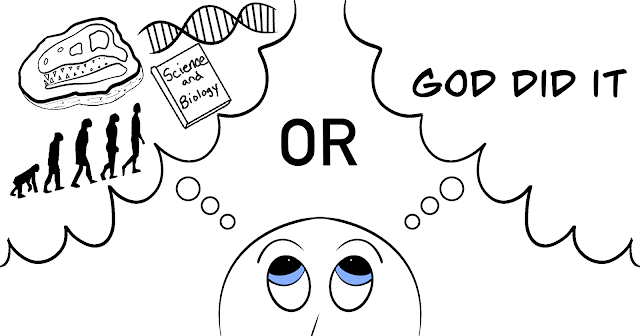I don't understand this, so it can't be true!
Does the following sentence sound familiar? "I can't understand how we could have possibly evolved from single-celled organisms. It can't be true."
Or even: "I can't believe in a God that would condemn good people to hell."
These are logical fallacies called Argument from Personal Incredulity. It asserts that a proposition must be false because it is difficult to imagine, is not easily understood, or contradicts one's personal expectations.
It can go the other way too: believing in something because it appeals to one's credulity. For example: "I like the idea of cosmic justice, where bad people get punished. So there must be a God."
It's important to note that the person MAY reach the correct conclusion using the logical fallacy; but if the pathway to that conclusion is faulty, then it is still fallacious!
 |
| A very common path for a theist |
Why is this fallacious?
Obviously, to declare something false because it is difficult to imagine or understand is wrong on many levels. Any one individual can't possibly fathom everything. If one were to declare everything false that isn't immediately understood, then the only propositions that would be true are those that are simple and easy to understand.
Think about people who lived one thousand years ago. Could they have imagined the concept of a biological cell? If someone had come up with a theory that all living things were made of cells, and presented some evidence for it, the vast majority of people would dismiss the theory because of how different and nonsensical it would seem. But would they be right in dismissing it? Clearly not, since we now know that living things are made of cells. In this example, although we can't blame them for not being able to imagine something as small as a cell, it doesn't change the fact that they were incorrect to dismiss the theory.
Today, the theory of evolution and an old universe get the same treatment. Admittedly, evolution and natural selection take a lot of effort to understand. One must study biology, read many books, and have the type of mind that can fathom the unending chain of processes that must happen in order for evolution to take place. One must understand fossils and how species changed and diverged over time. It is plain to see that humans evolved from primates once all the evidence is evaluated in a non-biased manner. But many people don't take the time to do this.
It takes way less effort to accept that God made us from dirt than to actually take the time to understand human evolution. Plus, it makes people feel special to be made by God!
On the flip side, to declare that something is true just because it sounds good or it appeals to one's sense of belief, gives them hope, or makes them feel complete, is just as fallacious. To believe that humans are the epitome of God's creation and that we are made in his image may make people feel good and special, but that has nothing to do with the truth value of that proposition.
Bottom line: The way a proposition makes someone feel has nothing to do with the actual truth of the proposition.
Examples of Personal Incredulity
- Even if evolution is true, life is too complex to have arisen by completely natural processes. God must have guided it.
- I don't see why people would have invented the claims that are in the gospels. What would they have to gain by doing that? The gospels must be true. Jesus is Lord!
- All that newfangled digital marketing isn't as good as old-fashioned door-to-door sales. -said by old sales person
- Belief in Jesus Christ gives me hope and makes all my troubles go away.
- A real life example that someone said to me: "I can't accept that this is all there is; life is too complex for it to be accidental/chance, and people have so much more mental capacity than any other life on earth...we think about eternity, afterlife, etc., and it makes no sense for that awareness/desire to exist unless God placed it in us."
The Bottom Line
- how easy the proposition is to understand
- how much it appeals to our common sense
- whether or not it offends our sensibilities
- whether or not it makes us feel good
The good thing about Science is that it’s true, whether or not you believe in it. -Neil deGrasse Tyson


Comments
Post a Comment
Please leave a respectful and kind comment.